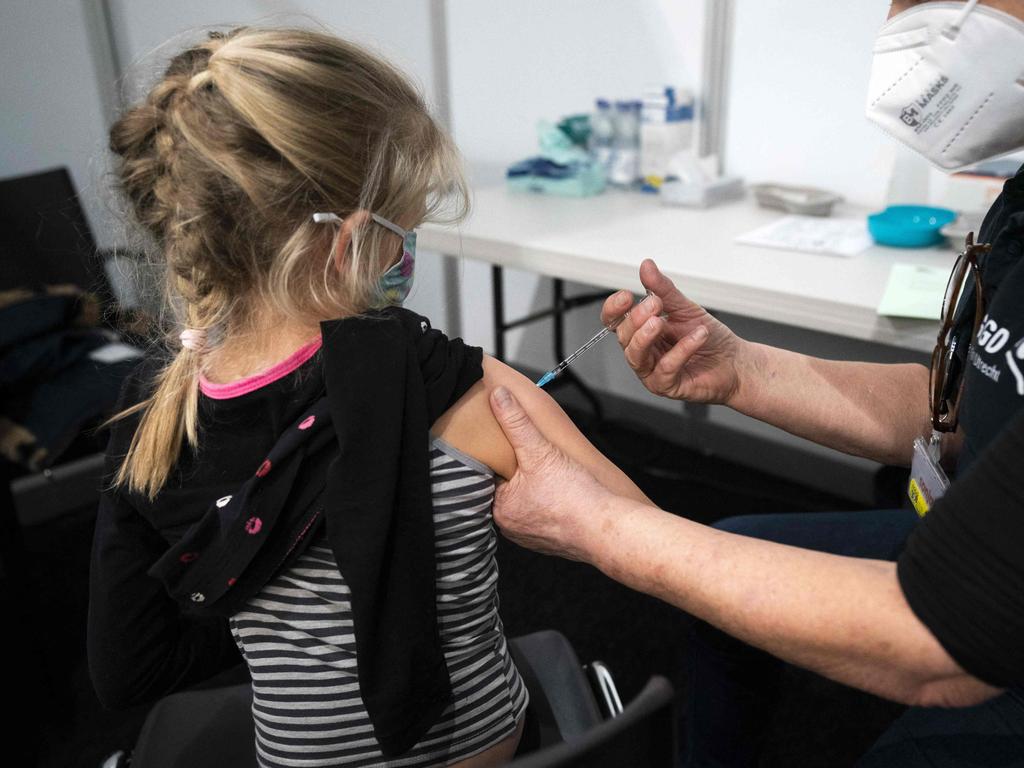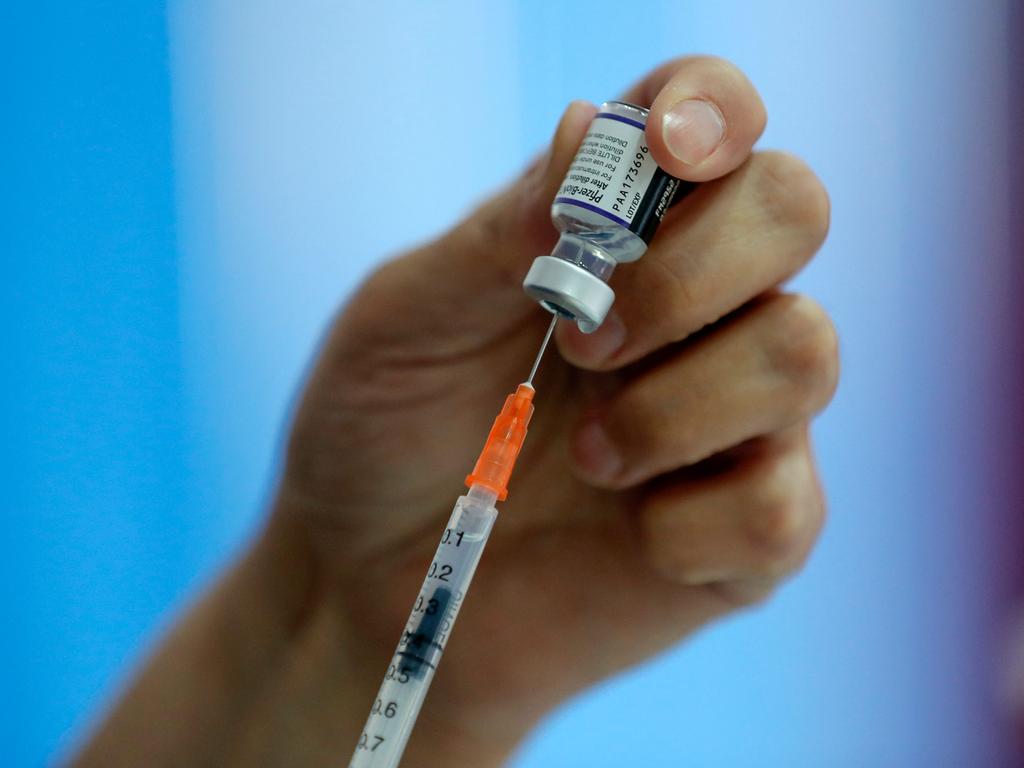Paediatrician says children as young as 12 should be vaccinated ‘against their parents wishes’
A Melbourne paediatrician has encouraged doctors to administer Covid-19 vaccines to children as young as 12 against their parents’ wishes.
Parenting
Don't miss out on the headlines from Parenting. Followed categories will be added to My News.
A Melbourne paediatrician has encouraged doctors to administer Covid-19 vaccines to children as young as 12 against their parents’ wishes, arguing it is both ethically and legally permissible.
John Massie, professor of paediatrics at the University of Melbourne, says there is “no ethical barrier” to vaccinating children under the “mature minor” doctrine – and that providers should not fear legal repercussions as the federal government has fully indemnified clinicians and drug makers against any adverse reactions.
Prof Massie is the co-author of an article in the Medical Journal of Australia published this week which examines the ethical considerations of vaccinating young people.
The article calls for the vaccination of children as young as 12 without parental consent to be adopted as a national standard, citing public health, the best interests of the child, and young people’s “right to privacy”.
“We’re trying to preserve parental involvement in the care and treatment decisions,” Prof Massie told the MJA Podcast.
“Parents are legal and natural decision-makers for their kids, but they don’t have absolute authority or absolute sovereignty over their kids … We wouldn’t be encouraging kids to keep it a secret unless they had to. We would like kids to tell their parents that they’ve had it.”
This week's MJA #podcast is now available. Prof John Massie, respiratory paediatrician & bioethicist talks about the ethics of vaccinating kids who want protection from #COVID19, against their parents' wishes. It's #freeaccess at https://t.co/6dLQfYSd33#medtwitterpic.twitter.com/GeZzcfs1bY
— MJA (@theMJA) January 25, 2022
He stressed the role of doctors was “not to be adversarial with parents”, but that as children got older medical decisions gradually moved “towards a sort of three-way decision-making agreement”.
“Then as the kids are a bit older, then sort of less relying on the parental input,” he said. “And if the parents are refusing something that the doctor and the kid think is good for them, then the weighting of the parent’s view becomes much less.”
Writing in the MJA, Prof Massie and co-authors Georgia Paxton, Nigel Crawford and Margie Danchin argue that the risk of serious but rare side effects of myocarditis and pericarditis, particularly in young boys, are outweighed by the benefits of vaccination.
“These episodes typically occur within days of the second dose, are usually mild and self-limiting, and respond well to anti-inflammatory medication – occurring at a rate of about one in 20,000 vaccines in the 12-19 year age group,” they write.
“While severe outcomes from SARS-CoV-2 infection in children are rare, leading some to question the need to vaccinate children, the risk-benefit analysis remains clearly in favour of vaccination.”
They say there is “no minimum age for a mature minor”, as so-called Gillick competence – based on a UK case which affirmed the right of minors to receive contraception – is assessed by clinicians on a case-by-case basis.

“There is evidence that many young people have similar cognitive capacity to adults, which would suggest that they should be able to give informed consent for Covid-19 vaccination,” they write.
“Conversely, neurobiology also tells us that adolescents may have a reduced appreciation of risk. However, given the known risks of SARS-CoV-2 infection outweigh the risks of an adverse event to a Covid-19 vaccine, and that the vaccine is strongly protective, this concern against vaccinating young people does not hold ethical weight.”
They note that adolescents are still developing long-term planning ability, meaning “current decisions may be regretted later”.
But they conclude that “regret is not unique to adolescence and given the short-term nature of vaccination, the possibility of regret also does not carry a great deal of ethical weight against vaccinating the young person”.
The authors warn that if the parents hold strong anti-vaccination views, “the young person may need support if there is a fallout”.
“Post-vaccination support, to manage family conflict or adverse reactions to the vaccine, should be organised through the young person’s GP or community health provider,” they write.
“The federal government has indemnified clinicians and implemented a no-fault claims process for the Covid-19 vaccine. This applies to vaccines given at any age, including to young people aged 12-17 years. Therefore, negligence claims in the event of a vaccine adverse event should not be a reason to deter a vaccine provider from giving the vaccine.”
Speaking on the MJA Podcast, Prof Massie said he was also recommending children as young as five get the vaccine, even though “we don’t have lots of data about the serious” side effects.
“In the 12- to 17-year-olds there was concern about myocarditis, particularly for boys … so it’s probably going to be some of the younger kids getting the same too,” he said.
“The initial studies don’t have the power to pick that up, but I still think the benefits well and truly outweigh the risks.”

Adverse reactions in children
More than three quarters, or around 943,000 children aged 12 to 15 in Australia are now fully vaccinated, according to federal Health Department figures as of Tuesday.
Nearly 714,000 children aged five to 11, or around 31 per cent, have received their first dose.
As of January 16, the Therapeutic Goods Administration says it has received 3085 reports of adverse reactions in children after vaccination with Pfizer or Moderna.
The most common reported reactions in children aged 12 to 17 are chest pain, headache, dizziness, nausea and fever.
In its most recent weekly update, the TGA also provided the first data for adverse reactions among children aged five to 11, revealing there had been 54 reports so far.
“The most common reactions reported included vomiting, paleness, fainting, dizziness and headache,” the TGA report said.
The TGA declined to specify the most serious reported reaction among this age group.
“To date, there is no signal for any new safety concerns arising from the limited number of adverse event reports received for children,” a spokeswoman said in a statement to news.com.au.
“This is consistent with extensive international experience, including in the US where more than eight million doses of Comirnaty have been given to children aged five to 11 years.”
The spokeswoman said of the 54 reports, “the vast majority describe expected and non-serious adverse events”.
“There are a number of individual reports of other types of reactions, none of which represents a signal for any serious reaction,” she said.
“We encourage reporting of adverse events even if people think there is only a small chance the event could be linked to vaccination. Some events would have happened anyway, regardless of vaccination. This is particularly the case when millions of people are being vaccinated.”
The federal government’s vaccine advisory body, the Australian Technical Advisory Group on Immunisation (ATAGI), recommends the vaccine for children aged five to 11 based on both the “direct benefits for the child in preventing illness” and the “indirect benefits”.
Indirect benefits include reducing the likelihood of school closures and “disruptions to extra-curricular and social activities resulting from Covid-19 related public health measures”, as well as protecting adults from infection.
In its guidance, ATAGI says the paediatric Pfizer Covid-19 vaccine “has been demonstrated to reduce Covid-19 in children five to 11 years of age”, citing a study published in the New England Journal of Medicine.
That study, which involved 2186 trial participants, recorded three observed cases among the vaccine group compared with 16 cases in the placebo group.
The three cases in the vaccine group were “mild and without fever”, whereas most cases in the placebo group “had documented fever”.
“There were no cases of severe Covid-19 in either group,” ATAGI notes.
More Coverage
Originally published as Paediatrician says children as young as 12 should be vaccinated ‘against their parents wishes’









